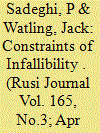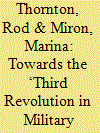| Srl | Item |
| 1 |
ID:
174502


|
|
|
|
|
| Summary/Abstract |
There has been persistent confusion among European and US diplomats over the public statements of Ayatollah Khamenei on matters of foreign policy. Despite significant Iranian pragmatism in negotiations, Khamenei’s pronouncements are consistently combative. P Sadeghi and Jack Watling examine the evolution of the concept of velayat-e faqih, which underpins the position of the Supreme Leader, and how it has been promulgated, and argue that Khamenei has developed a narrative of infallibility. This, combined with the obligations pertaining to his office as an Ayatollah, have made him uniquely constrained in his ability to publicly alter his language. At the same time Khamenei has worked to centralise power around his office, thereby creating a paradox by which the most powerful decision-maker in Iran is unable to offer clear public leadership for fear of being proven wrong.
|
|
|
|
|
|
|
|
|
|
|
|
|
|
|
|
| 2 |
ID:
174501


|
|
|
|
|
| Summary/Abstract |
Grand strategy is hailed by some as a silver bullet for resolving policy drift, while others reject it as a hubristic term. William James argues that expectations of this concept need to be revised. The first half of this article addresses the study of grand strategy. James identifies and critiques the prominent conceptual frameworks for evaluating grand strategy. He offers an alternative approach for measuring the quality of a state’s grand strategy, based on the notion of proportionality. The second half is tailored towards policymakers, as the article assesses the ways in which grand-strategic thinking can be improved in government.■
|
|
|
|
|
|
|
|
|
|
|
|
|
|
|
|
| 3 |
ID:
174497


|
|
|
|
|
| Summary/Abstract |
This article explores how threat actors are manipulating the British information environment and provides recommendations for how the government and citizenry might defend themselves. Daniel Dobrowolski, David V Gioe and Alicia Wanless argue that enforcing heavy moderation of content is counterproductive and that civic education, transparency and ongoing research into the methods that threat actors use are essential to guide an effective response and provide original research towards this end. Through a case study approach, the article assesses two recent type-case informational threats and considers the role the UK government can play, as a model for other Western states facing similar threats, in defending against them.
|
|
|
|
|
|
|
|
|
|
|
|
|
|
|
|
| 4 |
ID:
174499


|
|
|
|
|
| Summary/Abstract |
Thus far, the strategic importance of the GIUK–N (Greenland–Iceland–UK–Norway) region has been understood in a transatlantic context. With the opening of the Arctic Ocean, however, the region’s strategic significance as the gateway to the Arctic is increasing. In this article, Rebecca Pincus argues for the incorporation of a new, transpolar perspective into strategic considerations of the GIUK–N. A strategic re-evaluation is timely to prepare US and NATO forces to play a shaping role as the Arctic Ocean continues to open and great power competition persists.
|
|
|
|
|
|
|
|
|
|
|
|
|
|
|
|
| 5 |
ID:
174496


|
|
|
|
|
| Summary/Abstract |
There is an ongoing international arms race in the field of artificial intelligence (AI). But whereas military organisations in the West are viewing AI principally as an enabler in the tactical realm, this is not the case in Russia. The Russian military sees AI’s greatest utility at the strategic level. Its emphasis is on employing AI-enhanced information warfare tools (including in cyber warfare) to produce truly game-changing strategic effects against state adversaries. AI’s use in this capacity heralds a ‘third revolution in military affairs’. Rod Thornton and Marina Miron examine its profound implications for the future of warfare
|
|
|
|
|
|
|
|
|
|
|
|
|
|
|
|
| 6 |
ID:
174500


|
|
|
|
|
| Summary/Abstract |
NATO has remained relevant for 71 years because it has stayed committed to the purpose, values and principles of the North Atlantic Treaty of 1949 while at the same time continually adapting to the changing strategic environment. That dual-track formula should continue to serve as guidance for success in the coming years. John Andreas Olsen reviews how NATO has responded to Russia’s annexation of Crimea and the rise of the Islamic State since 2014, identifies six core challenges and suggests approaches for meeting them
|
|
|
|
|
|
|
|
|
|
|
|
|
|
|
|
| 7 |
ID:
174498


|
|
|
|
|
| Summary/Abstract |
The provision of healthcare for military personnel and veterans is an important component of the covenant between the state and its armed forces. While most emphasis is placed on the field medical system, the majority of clinical activity and healthcare costs arise from healthcare in garrisons and for veterans. In this article, Martin Bricknell and Paul Cain propose a high-level concept for a whole-of-military healthcare system that encompasses both operational and non-operational health services – the defence healthcare cycle.
|
|
|
|
|
|
|
|
|
|
|
|
|
|
|
|